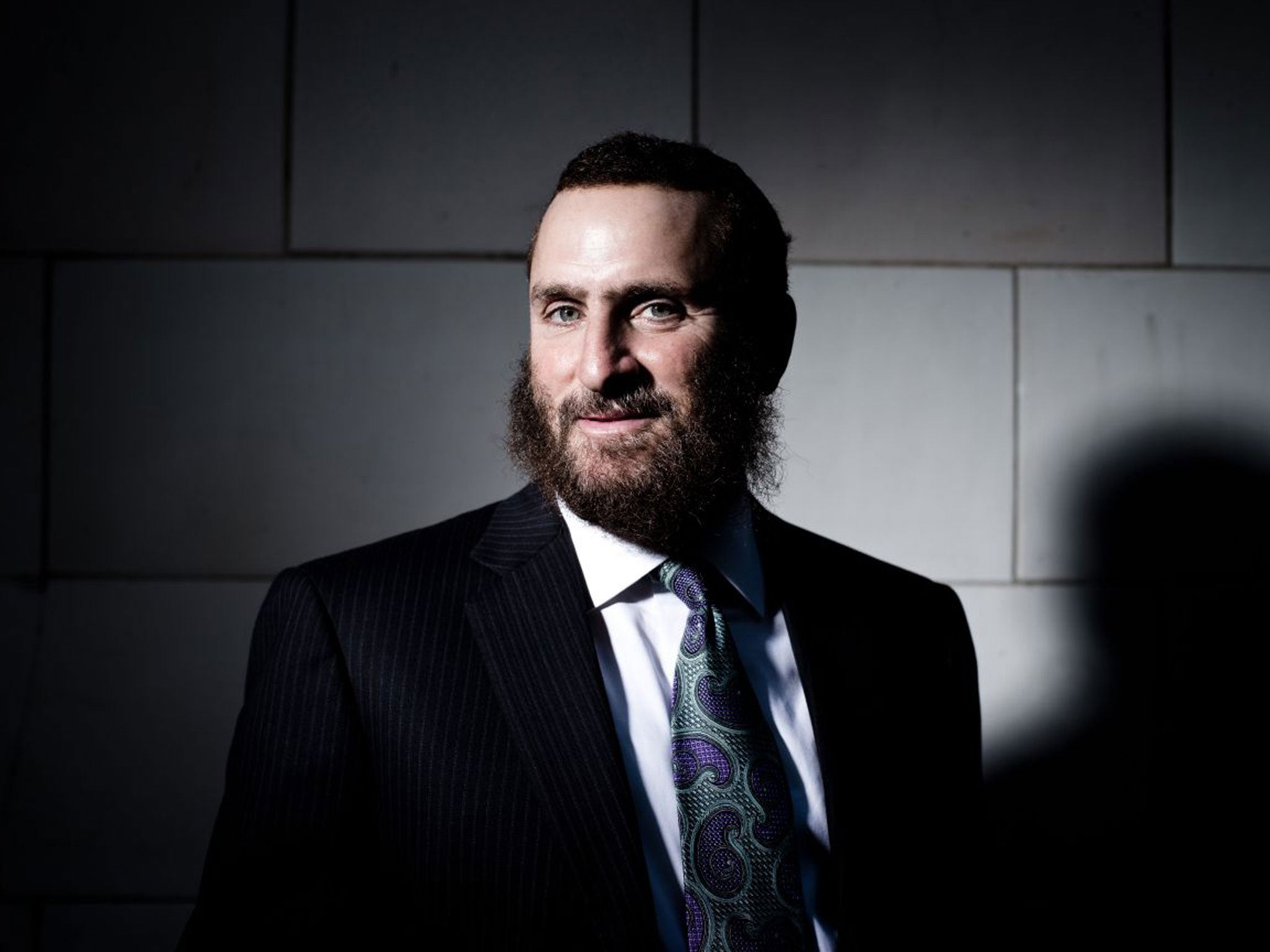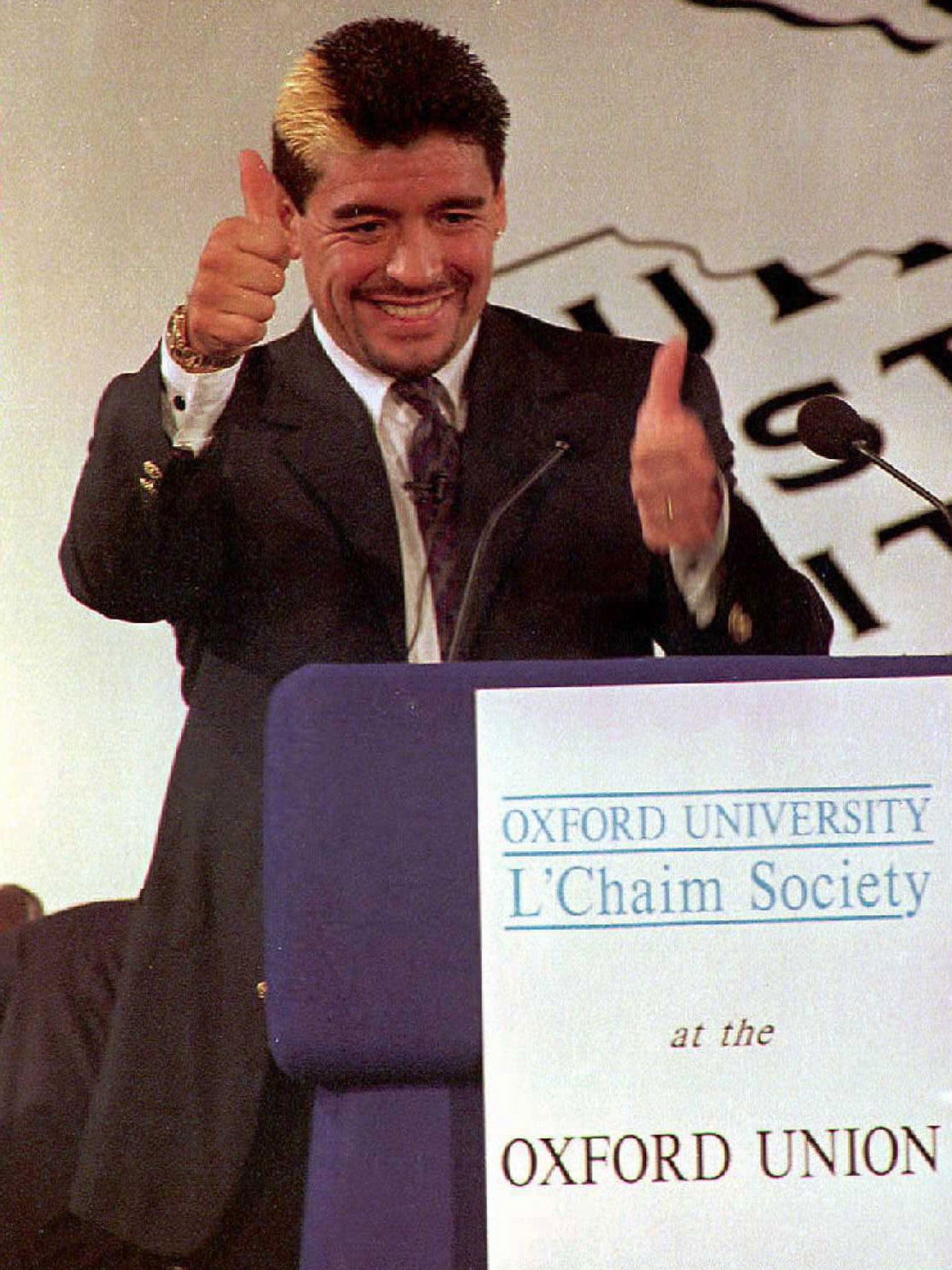Shmuley Boteach: Sex, Sainsbury's, celebrity... and anti-Semitism
The self-proclaimed 'Rabbi of America', says Britain has grown worryingly anti-Israel – and he wants us to listen to him

What is Shmuley Boteach doing back here? The charismatic, outspoken rabbi says Britain is being swamped by "a tsunami of anti-Semitism and Israel hatred" and is "easily the most hostile to Israel in all of Europe". With Mario Balotelli and Dave Whelan's recent comments in the last few days alone, he has some evidence.
So why is this short, stocky man in a pinstripe suit and a yarmulke in the back of a car heading for the Oxford Union, the place where he first made his name? "I became a man here. Six of my nine children were born here. I love Britain. That is why I am so shocked to see how hostile Britain has become to Israel."
His black beard has been salted and peppered since the days when the so-called Moses of Oxford led L'Chaim, a Jewish society so open it famously had a Christian president and hundreds more non-Jewish members than Jews. They came for the brilliance of his oratory, the warm welcome to people of all faiths at the dining table and an incredible line-up of speakers which included Maradona, Gorbachev and Michael Jackson. The rabbi, now 48, was even named Preacher of the Year, out of all the faiths in Britain.
Then he went off to the US to make himself even more famous, through his own reality show Shalom in the Home and books such as Kosher Lust, which says that it is part of Jewish law for women to orgasm before their husbands. The Jerusalem Post has named him among the 50 most influential Jews in the world.
The self-styled Rabbi of America appears on The Oprah Winfrey Show and hangs out with presidential hopefuls Cory Booker and Ted Cruz. And lobs increasingly strong insults at his old home across the water, like the ones I have quoted. If this country is so hostile, why has he come back now? Why is he talking about relaunching L'Chaim and hoping to return to Oxford regularly to stand up for "Jewish values" and the state of Israel all over again?
"When I say that Britain hates Israel more than any country in Europe, I mean just based on the parliamentary and public facts of non-stop attacks against Israel, which betray the whole British ideal of liberal democracy," says the 48-year-old preacher in the loud rat-a-tat tones of his current home, New Jersey. He has come to debate Israel at the Union and this will be his only interview.
"You can't be a Jew and not love Britain, which alone fought Hitler when the whole world gave up," he says. "So when I see Britain turning on the only open liberal democracy in the Middle East, when I see a tremendous rise in anti-Semitic violent attacks against Jews, well beyond anything that happened when I lived here, that is very troubling."
There has been a worrying rise in anti-Semitic violence, vandalism and abuse over the past year. There was a spike in July, after Israel sent its tanks into Gaza. Figures released by the Mayor of London a few days ago show a 23 per cent rise in faith-based hate crime in the capital for the year to October, with 1,040 incidents. But this is not just a Jewish problem: the total is for all faiths and there was a similar surge in attacks on Muslims after the murder of Lee Rigby last year. The situation is serious, but are the figures really enough to condemn a whole nation as anti-Semitic?
"I am not saying that the British people are anti-Semitic," he says, despite having appeared to suggest exactly that. "I don't believe that. I do believe there is a strong anti-Israel sentiment growing in the UK which demonises Israel, perversely, and it is not being sufficiently opposed by the mainstream. That is giving the impression to the rest of the world that Britain is becoming more and more anti-Semitic."

Isn't he the one giving that impression? A recent column told his readers that "anti-Semitism engulfs even art and food in Britain". The word engulf means to completely surround or overwhelm, but he gave just two examples: "The Tricycle theatre in London cancelling the Israel film festival and Sainsbury's removing kosher items from its shelves".
The Tricycle changed its mind, actually.
"How could a supermarket take kosher food off the shelves? What did the Jewish community of Britain do to deserve to be punished?"
Hang on. The manager of one Sainsbury's in Holborn, central London, took kosher foods out of one fridge display (leaving them visible elsewhere in the store) because he was worried about protests during the Gaza conflict. Sainsbury's says it was wrong and it will never happen again. I am not trivialising this, just pointing out that the rabbi's hyperbole damages his own case.
"When anti-Semitism is not sufficiently opposed by the British people it can grow," he insists. "We are kind of tired of unwarranted attacks against Jews. We don't deserve it. We are the victims of it. It's outrageous. What is it about us?"
The BBC is "in league with Hezbollah", he says – but he backs down again when challenged and settles for saying it does not report fairly.
"I call it underdogma," Boteach says, explaining that the British instinctively side with the underdog, which, in this case – because of a public relations con, in his view – means the Palestinians. "They are championing the underdog."
Sparring with him would be exhausting, except for the boyish glee with which he debates. If you can get a word in edgeways, he does appear to listen. Anyone was welcome at L'Chaim, regardless of creed, but it folded after he left for America in 2001. There he made an industry out of talking with surprising frankness about sex and love.
Beyond the headlines about lust, anal sex and S&M being kosher, there is a startling amount of compassion and common sense in those books. So what does it do for your own love life, when you're seen as a sex guru?
"Talking about these matters reminds me that I want to have a loving, intimate, romantic relationship with my wife," he says. Debbie is in the front seat, listening. "She risked a lot for me. She followed me to England when she was 19. That's insane. She lived in Australia. We had no money, we had nothing, and she believed in me always. I have come under significant attack in my career many times and she has stood by me. So I owe her everything. By that, I mean all of me. And to acknowledge the woman in her."
What if she doesn't want the woman in her acknowledged at that particular moment? Debbie laughs in the dark. "Well, I always say, 'Don't complain if the dish is half-baked, if you have taken no time to heat up the oven …'"
I have a sudden urge to move on. He was close friends with Michael Jackson for a while, having been introduced by Uri Geller. They spent two Thanksgiving holidays together. "It was kinda normal. Every genius is eccentric. He liked being around normal families." Yes, but was he creepy? "Honestly? Not at all. I could try to tell you that he was normal, but I criticised Michael so I have a certain amount of credibility," he says.
"I never criticised him for being creepy: he wasn't. I never criticised him for being a paedophile: he wasn't. Rather, I criticised him for not being able to let go of his dependency on the audiences, on the crowds. Had he let go of that and not needed their love so badly, had he healed a little bit, he might be alive."
Jackson regained strength in his company but the rabbi says he was then frozen out by promoters. "I felt superfluous. I wasn't just going to be a hanger-on. When you see someone you care about driving their life off a cliff, do you watch and wave? Or do you say: 'I just can't watch this.'"
After the singer died, Boteach chose to publish transcripts of conversations between them. Is he just desperate to be rich and famous? "We are not poor, thank God, but we never became wealthy." Maybe he should talk to his accountant, but Boteach says 85 per cent of what he does is for free. "There is one simple reason. My vanity is relevance. I want to feel that I have something to say that's valued."
Other Jewish leaders have condemned his very modern attitudes to homosexuality and sex, not to mention his "heretical" book Kosher Jesus, so who does he speak for these days?
"The Jews have no Pope. I have nominated myself. Ha!" That's how it works, he says. "Britain has a Chief Rabbi but, outside this country, it is whoever rises to a position of being heard, based on people actually listening. So who do I speak for? Whoever decides that I speak for them – to the extent that we're strong in media, social media, book sales, columns being written and invitations to speak to Jewish and non-Jewish audiences across the world; these people want to hear me." And, wherever he goes, more than anything, Rabbi Shmuley Boteach just wants to be heard.
Bookmark popover
Removed from bookmarks